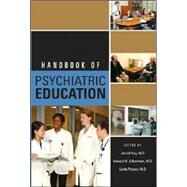Handbook of Psychiatric Education
, by Kay, Jerald- ISBN: 9781585621897 | 1585621897
- Cover: Paperback
- Copyright: 10/1/2005
Broad-based and comprehensive, the Handbook of Psychiatric Educationcovers all aspects of academic psychiatry responsibilities in teaching and education of students and residents. A concise, single-volume resource for faculty development in education, it incorporates recent innovations in teaching medical students and residents and details the newest technological tools for instruction. Its 14 chapters by 22 distinguished contributors address curriculum development and ongoing evaluation, specific teaching methods, organization and accreditation of educational programs, challenges and problems in teaching and administering graduate and undergraduate programs, role and functions of a teacher, and teaching residents how to teach. The Handbook of Psychiatric Education, which shares many topics with the editors' 1999 Handbook of Psychiatric Education and Faculty Developmentaddresses current trends, such as assessment methods for residency programs, the lack of researchers in psychiatry, the increase in applicants to resident psychiatry programs, and more stringent requirements for accountability in medical student education, in chapters on Residency "special events," including a new-and unfortunately necessary-section on dealing with disasters and terrorism Teaching residents how to become effective teachers, including information relevant to the medical student curriculum and the residency New undergraduate medical education teaching methods, including advice on determining which "reform" methods (such as problem- and case-based learning) are best suited to which types of educational goals, subject matter, and students The selection of undergraduate preclinical curriculum, including guidance on how to divide course offerings between nontechnical aspects of medical practice, such as the doctor-patient relationship and interviewing, and competing technical aspects, such as neuroscience, human development, and psychological theories New technologies in education, including discussion of the advantages and disadvantages of computer-based textbooks and clinical materials versus traditional materials and of live versus electronic teachers and addressing questions about Internet resources and required computer skills A wide-ranging and provocative look at the future of psychiatric education Sure to become required reading for all psychiatry faculty, the Handbook of Psychiatric Educationis also invaluable reading for psychiatry residents, medical faculty, and members of the Association for Academic Psychiatry, the American Association of Directors of Residency Training in Psychiatry, the Association of Directors of Medical Student Education in Psychiatry, review committees, and licensing bodies.






